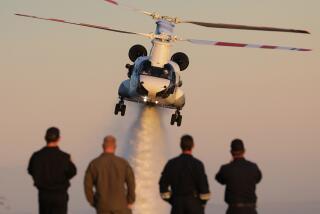Silence: It Surely Is Grand
- Share via
Shhhh. Listen.
To what?
Nothing.
Ah, sweet silence. At last, some real quiet will be afforded visitors to Grand Canyon National Park, 15 years after Congress told the National Park Service and the Federal Aviation Administration to “substantially restore natural quiet” at the canyon by cutting back on flights of sightseeing airplanes and helicopters.
In response to Congress, the FAA adopted regulations, supposedly to limit the number of flights and to ban flights in parts of the canyon. Even so, the number of flights soared from 40,000 to 130,000 a year from 1987 to now.
Environmental groups sued, and now the U.S. Court of Appeals for the District of Columbia has ordered the FAA to adopt a stricter definition of “natural quiet” in regulating the overflights.
The court rejected the FAA practice of averaging the noise over a year and using that as the daily limit. The result was many more flights--and much more noise--in summer than in winter. The court said the fact the park was quiet “on average” was cold comfort to a summertime visitor.
The court also said the FAA would have to factor in the noise of commercial flights over the canyon when setting acceptable noise regulations. The same court earlier told the agency to consider the effect of flights over Zion National Park when approving a new airport at nearby St. George, Utah.
Environmental groups say the ruling signals a new attitude by the courts in affirming that quiet is a natural resource of the parks and should be protected like water and wildlife.
The ruling should be a factor as the Park Service reviews a partial ban on snowmobiles in Yellowstone National Park. The Bush administration has signaled that it will allow a certain amount of snowmobiling to continue. Both snowmobiling and sightseeing flights are banned in Yosemite Valley.
A lawyer for the Grand Canyon flight operators said the new rules would drive them out of business and deny the elderly and disabled a chance to see Grand Canyon. That’s not likely. The FAA could comply simply by limiting flights, expanding no-fly zones or ordering the operators to use quieter planes. And there is ample opportunity for the elderly and the disabled to visit the canyon on the ground. Now, that will be more pleasant. They and others may even be able to hear the birds sing, the coyotes howl and the river gurgle.
More to Read
Sign up for Essential California
The most important California stories and recommendations in your inbox every morning.
You may occasionally receive promotional content from the Los Angeles Times.













